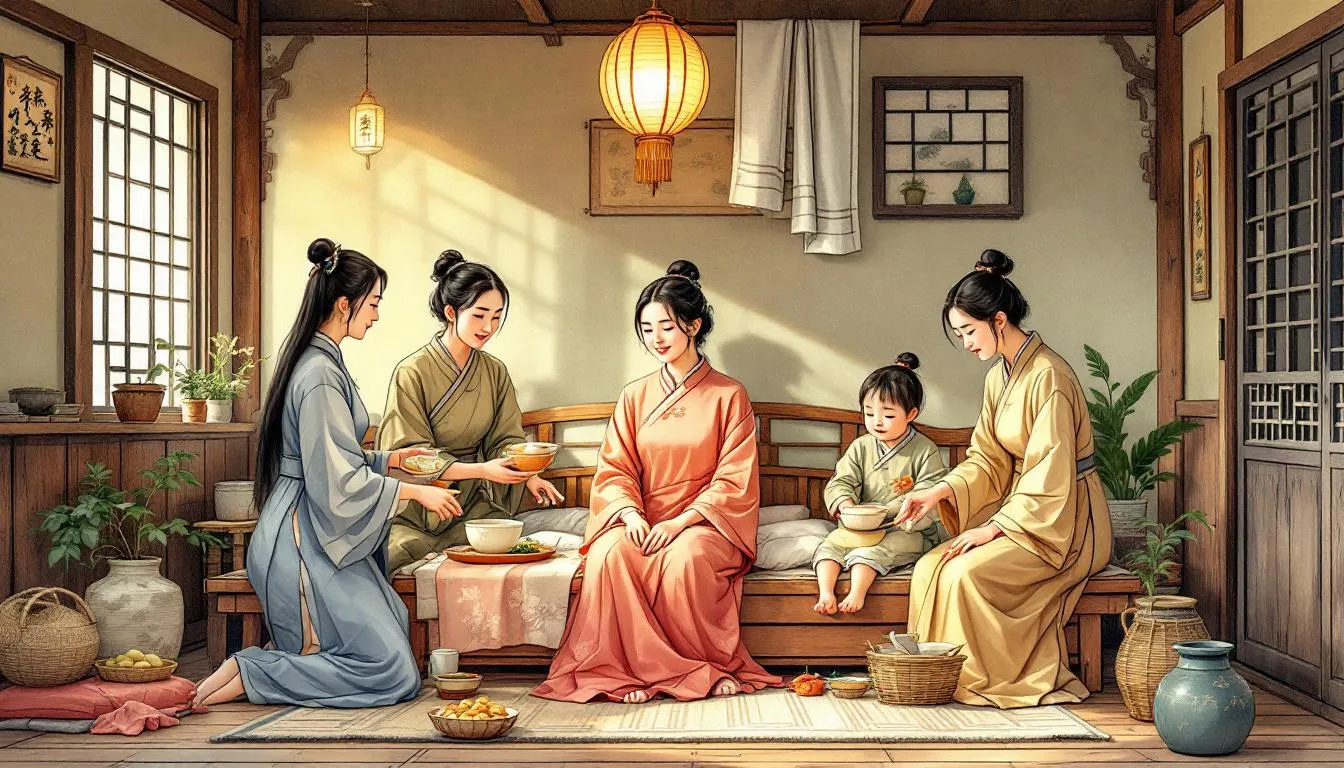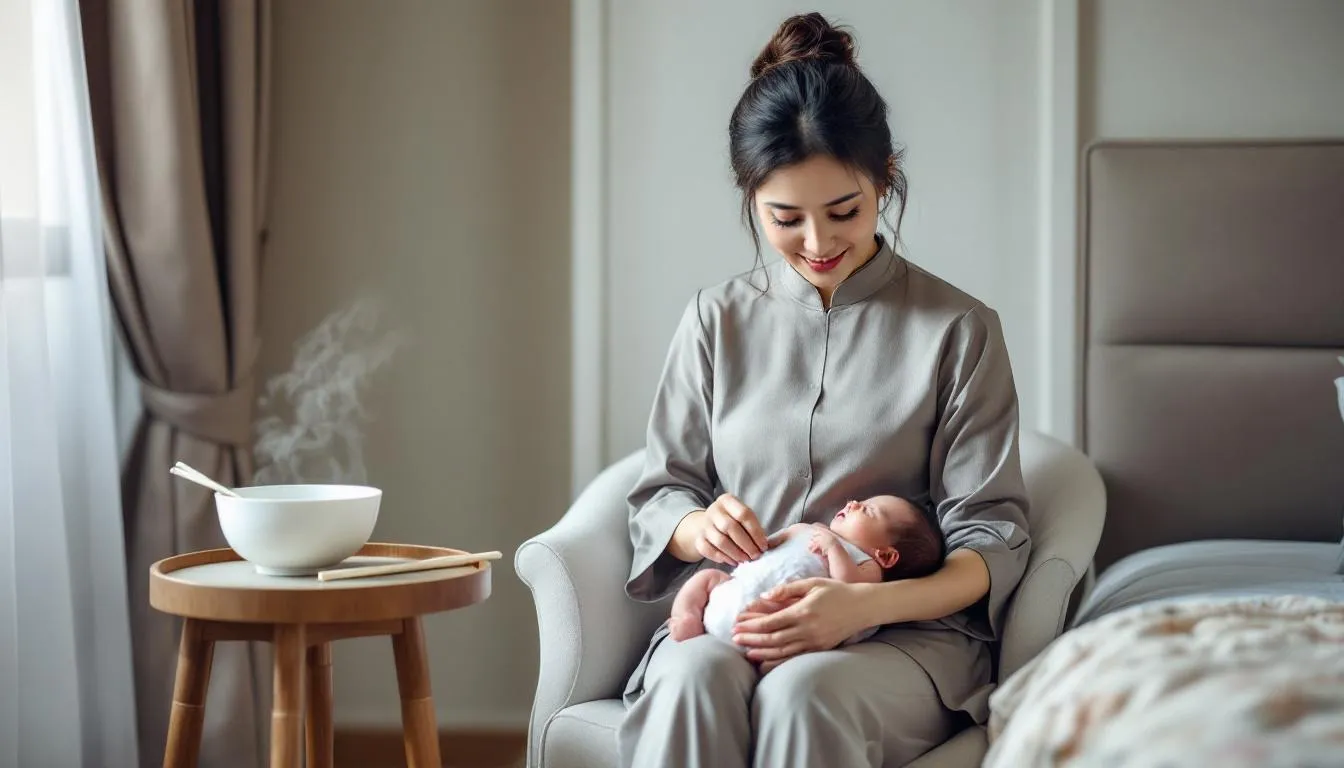
For over two millennia, Chinese mothers have followed a sacred postpartum tradition that prioritizes complete rest, specialized nutrition, and unwavering family support. This practice, known as confinement in Chinese culture or 坐月子 (zuò yuè zi), literally translates to “sitting the month” and represents one of the world’s most comprehensive approaches to postpartum recovery.
Dating back to the Han Dynasty (206 BCE–220 CE), chinese confinement has evolved from ancient survival necessity into a sophisticated care system that modern research increasingly validates. While some traditional rules may seem restrictive by contemporary standards, the core principles of extended rest, nutritional support, and family involvement offer valuable insights for postpartum care across all cultures.
This comprehensive guide explores the rich history, practical applications, and modern adaptations of chinese postpartum confinement, providing both cultural understanding and practical guidance for families considering this traditional approach to maternal recovery.
What is Chinese Confinement (坐月子)?
Chinese confinement, known as 坐月子 (zuò yuè zi), literally means “sitting the month” and represents a traditional 30-day postpartum practice dating back over 2,000 years to the Han Dynasty. This comprehensive recovery regimen involves complete rest, specialized diet, and protection from cold and wind after giving birth, based on traditional chinese medicine principles that view childbirth as depleting qi (vital energy) and blood.
The confinement period typically extends to 42-45 days for C-section deliveries due to longer surgical recovery needs. Traditional chinese medicine theory holds that childbirth creates a “great opening” in the mother’s body, leaving her vulnerable to external influences that could cause chronic health problems if proper restoration doesn’t occur during the critical postpartum period.
Modern chinese confinement practices maintain these foundational elements while adapting to contemporary lifestyles and medical understanding. The practice emphasizes that inadequate recovery during this crucial window can lead to long-term health issues, making the investment in proper confinement care essential for the mother’s physical and emotional wellbeing.
Historical Origins and Cultural Significance

The origins of chinese confinement tradition are deeply rooted in agrarian chinese society, where protecting mothers from hard physical labor was essential for survival. In pre-modern China, women faced significant risks during childbirth and needed extended recovery periods to regain strength for demanding agricultural work and household chores.
Traditional chinese medicine expanded on these practical observations, developing theories about the postpartum body being in a state of “great opening” that required careful restoration. Classical texts such as the Book of Rites codified early postpartum customs, emphasizing protection from harmful environmental elements and the importance of proper nutrition for recovery.
The practice has been transmitted through generations via oral tradition from mothers to daughters, creating a rich cultural legacy that extends beyond mere health practices. Similar postpartum traditions exist across asian cultures, including Malaysia’s “pantang,” Korea’s “samchilil,” and India’s “jaapa,” demonstrating the widespread recognition of intensive postpartum care needs.
In chinese society, confinement serves multiple functions beyond physical recovery. It reinforces family bonds, establishes support networks for new mothers, and provides a structured transition into motherhood. The practice also reflects traditional beliefs about the vulnerability of new mothers and the collective responsibility of family members to ensure proper care during this critical period.
Core Principles of Chinese Confinement
The foundation of chinese confinement rests on complete physical rest to allow internal organs to return to their pre-pregnancy state. traditional chinese medicine theory suggests that pregnancy and childbirth displace and weaken internal organs, requiring extended rest for proper realignment and strengthening.
Warming and nourishing diet forms another cornerstone, designed to replenish blood and restore energy balance disrupted by childbirth. The confinement diet emphasizes “warming” foods that promote blood circulation and support milk production while avoiding “cooling” foods believed to impede recovery.
Protection from wind, cold, and damp conditions represents the third principle, based on traditional beliefs that exposure to these elements during the vulnerable postpartum period can cause future ailments. This principle influences everything from clothing choices to bathing restrictions and environmental controls.
The practice also emphasizes minimal physical activity and complete avoidance of household chores, allowing the new mother to focus entirely on recovery and bonding with her newborn baby. This comprehensive support system aims to prevent both immediate complications and long-term health issues.
The Four Pillars of Recovery
Rest (休息) involves complete physical and mental relaxation for 30 or more days, with mothers encouraged to remain in bed and limit movement to essential activities only. This extended rest period allows hormonal regulation, tissue healing, and energy restoration that supports both physical recovery and emotional adjustment to motherhood.
Nutrition (营养) centers on special confinement meals designed to restore strength and enhance milk production. The confinement diet follows traditional chinese medicine principles, emphasizing foods that warm the body, nourish blood, and support the mother’s recovery while providing nutrients essential for breastfeeding.
Warmth (保暖) requires maintaining body temperature through layered clothing, covered head and feet, and avoiding exposure to cold air or air conditioning. traditional beliefs hold that the postpartum body is particularly susceptible to “wind invasion” that can cause joint pain and other chronic conditions later in life.
Support (支持) involves family members or professional caregivers providing comprehensive assistance with all daily tasks, from meal preparation to newborn care. This pillar ensures the mother receives both practical and emotional support while focusing entirely on recovery and establishing breastfeeding.
Traditional Confinement Rules and Restrictions

Traditional confinement practices include strict restrictions designed to protect the recovering mother from perceived threats to her health. No showering or hair washing for the first 2-4 weeks represents one of the most challenging rules for modern mothers, based on beliefs that water exposure can allow cold to enter the body through open pores.
Staying indoors and avoiding exposure to wind, air conditioning, or fans forms another fundamental restriction. Traditional practitioners believe that even gentle air movement can cause “wind invasion” that leads to chronic pain, headaches, or joint problems in later years.
New mothers must wear long sleeves, socks, and head coverings even in warm weather to maintain body temperature and prevent cold exposure. This clothing requirement extends to nighttime and indoor activities, creating a controlled environment that supports the body’s healing processes.
Physical restrictions prohibit lifting heavy objects, performing household chores, or engaging in any strenuous activity. Even prolonged sitting, reading, or watching television may be limited to prevent eye strain, which traditional chinese medicine considers particularly vulnerable after childbirth.
Visitor limitations help prevent exposure to germs and maintain a peaceful environment conducive to recovery. traditional rules often restrict all but immediate family members from visiting during the first weeks, reducing stress and infection risk for both mother and baby.
Dietary Guidelines During Confinement
The confinement diet emphasizes “warming” foods like ginger, sesame oil, and rice wine that are believed to restore internal heat lost during childbirth. These ingredients appear in nearly every confinement meal, often combined in dishes like sesame oil chicken or fish soup prepared with rice wine and red dates.
“Cooling” foods including most raw fruits and vegetables, green beans, and cold water are strictly avoided based on traditional beliefs that these foods slow healing and disrupt the body’s energy balance. Even drinking water must be warm or at room temperature to support digestive function.
High-protein meals featuring chicken, fish, pork, and organ meats provide essential nutrients for tissue repair and milk supply. Eggs appear frequently in the confinement diet, often prepared with ginger and sesame oil to maximize their warming and nourishing properties.
Herbal soups and teas prepared with traditional ingredients like angelica root, Chinese wolfberry, and ginseng support blood circulation and promote milk production. These preparations are often customized based on the mother’s specific needs and recovery progress.
Small, frequent meals throughout the day support better digestion and nutrient absorption while preventing digestive stress. Minimal salt and strong spices help prevent water retention and digestive issues during the sensitive recovery period.
Modern Adaptations and Scientific Perspectives

Contemporary mothers often modify strict traditional confinement rules while maintaining core principles that support recovery. Modern hygiene practices allow gentle showering with warm water and herbal preparations, followed by immediate drying and warming to address traditional concerns about cold exposure.
Healthcare professionals increasingly recognize the benefits of extended rest, family support, and proper nutrition while questioning restrictions that may conflict with modern medical knowledge. Many practitioners now recommend a balanced approach that incorporates traditional wisdom with evidence-based medicine.
Professional confinement centers offering medically supervised traditional care have emerged in urban areas, providing luxury accommodations with 24/7 nursing staff, traditional meal preparation, and modern amenities. These facilities bridge traditional practices with contemporary comfort and medical oversight.
Dietary flexibility has increased as nutritional science informs traditional practices. Some mothers now include carefully selected fruits and vegetables while maintaining emphasis on warming foods and avoiding excessive cold exposure.
Research on Confinement Effectiveness
Studies demonstrate lower rates of postpartum depression among mothers following traditional confinement practices compared to those without such comprehensive support systems. The combination of extended rest, family involvement, and reduced stress appears to provide significant mental health benefits.
Nutritional benefits from the protein-rich, iron-dense confinement diet support faster physical recovery, improved milk supply, and reduced risk of postpartum anemia. The emphasis on frequent, well-balanced meals provides steady energy for healing and breastfeeding demands.
Extended rest periods allow better hormonal regulation, pelvic floor recovery, and overall healing, particularly beneficial after difficult births or surgical deliveries. Research supports the value of reduced activity and stress during the early postpartum weeks.
Family support systems central to traditional confinement practices reduce maternal stress and promote bonding with the newborn. The availability of practical and emotional support correlates with improved maternal well being and successful breastfeeding outcomes.
However, studies also note that overly rigid adherence to traditional rules without consideration for individual needs or modern medical guidance can create stress and potentially harmful conditions. The key lies in maintaining beneficial principles while adapting specific practices to contemporary circumstances.
The Role of Confinement Caregivers

Traditionally, mothers-in-law or the woman’s own mother provided primary caregiving during the chinese confinement period, reflecting patrilocal family systems and the transmission of cultural knowledge across generations. This arrangement reinforced family bonds while ensuring experienced guidance for new mothers navigating the challenges of early motherhood.
Modern urban lifestyles have created demand for professional confinement nannies, known as yue sao (月嫂), who provide specialized postpartum care. These trained professionals combine traditional knowledge with modern caregiving skills, offering services that may not be available through family networks.
A qualified confinement nanny handles meal preparation according to traditional dietary principles, provides round-the-clock newborn care including feeding and sleep management, supports breastfeeding establishment, and manages light housework to ensure complete maternal rest. They also offer emotional support and monitor both maternal and infant wellbeing throughout the recovery period.
The professionalization of confinement care has created a growing industry with agencies providing certified caregivers trained in both traditional practices and contemporary infant care standards. This development makes traditional chinese confinement accessible to families without available extended family support.
Confinement Centers and Professional Services
Luxury confinement centers have proliferated in Taiwan, Singapore, hong kong, and major Chinese cities, offering comprehensive residential care that combines traditional practices with modern medical oversight. These facilities provide private accommodations, professional nursing staff, and structured recovery programs designed to optimize postpartum healing.
Services typically include 24/7 professional care from nurses, nutritionists, and traditional chinese medicine practitioners who monitor both maternal and infant health. Specialized chefs prepare traditional confinement meals while spa treatments and physical therapy support recovery and relaxation.
Advanced baby monitoring systems, lactation support, and pediatric care ensure infant health while allowing mothers to focus on recovery. Many centers also provide educational programs covering infant care, breastfeeding, and postpartum health management.
Cost varies significantly, from basic meal delivery services to premium residential programs with luxury amenities and comprehensive medical support. This range makes professional confinement care accessible across different economic levels while maintaining core traditional principles.
Regional Variations in Chinese Confinement
Northern China traditionally emphasizes longer confinement periods, sometimes extending to 100 days, with stricter warming food requirements and stronger aversion to bathing or cold exposure. The harsh northern climate and historical agricultural demands influenced these more restrictive practices.
Southern regions typically observe shorter confinement periods of 21-30 days with greater dietary flexibility and more acceptance of modern hygiene practices. The milder southern climate and different agricultural patterns created variations in traditional approaches to postpartum care.
Taiwan has developed approaches that emphasize scientifically validated nutrition while retaining traditional meal planning and herbal remedies. This integration reflects the island’s unique position bridging traditional chinese culture with modern medical knowledge and international influences.
hong kong and Singapore blend chinese customs with multicultural healthcare approaches, creating more flexible interpretations that accommodate diverse populations and modern medical practices. These urban centers demonstrate how traditional practices adapt to contemporary, cosmopolitan environments.
Overseas Chinese communities in western countries adapt confinement practices to local climates, available ingredients, and healthcare systems. These adaptations often require creative solutions for sourcing traditional foods and finding qualified caregivers while maintaining cultural authenticity.
Common Challenges and Solutions
Balancing traditional expectations with personal comfort and modern medical advice creates tension for many new mothers caught between family pressure and contemporary healthcare recommendations. Open communication with family members and healthcare providers helps establish reasonable compromise approaches.
Adapting dietary restrictions when living in non-Chinese environments requires creativity in sourcing ingredients and finding suitable substitutes for traditional foods. Many overseas communities develop networks for sharing resources and traditional ingredients to support confinement practices.
Finding qualified confinement caregivers in regions with limited Chinese populations presents logistical challenges that require advance planning and potentially importing services from other areas. Some families invest in training local caregivers in traditional practices.
Integrating confinement practices with modern responsibilities such as caring for older children, work obligations, or limited family support requires flexible approaches that maintain core principles while accommodating individual circumstances.
Mental Health Considerations
Extended isolation during traditional confinement may contribute to postpartum depression in some women, particularly those accustomed to active social lives or independent lifestyles. Maintaining social connections through phone or video calls can help address isolation while respecting traditional boundaries.
Professional counseling services are increasingly integrated alongside traditional confinement support to address mental health needs that may arise during the vulnerable postpartum period. This combination honors both traditional wisdom and modern understanding of maternal mental health.
Family communication becomes essential to prevent conflicts over confinement expectations and ensure that traditional practices support rather than stress the new mother. Flexibility in applying traditional rules allows for individual mental health needs and preferences.
The practice works best when it provides genuine support rather than additional pressure, requiring families to prioritize the mother’s overall wellbeing over strict adherence to every traditional rule.
Planning for Chinese Confinement
Successful chinese confinement requires beginning preparations 3-6 months before the due date, particularly for securing in-demand professional caregivers or confinement center reservations. Early planning prevents last-minute stress and ensures availability of preferred services.
Family discussions should clarify expectations and preferences for the confinement period, addressing potential conflicts between traditional requirements and personal comfort levels. These conversations help establish boundaries and ensure everyone understands their roles in supporting the new mother.
Practical preparations include researching local sources for traditional ingredients, herbal products, and professional services. Stocking up on specialty items before delivery ensures availability during the critical early weeks when shopping trips are restricted.
Home preparation involves creating a comfortable recovery space with proper heating, minimal drafts, and convenient access to necessary supplies. This environment supports traditional requirements while ensuring maternal comfort throughout the extended rest period.
Backup planning addresses potential complications such as caregiver unavailability, supply shortages, or unexpected medical needs that might disrupt traditional confinement arrangements. Having contingency plans reduces anxiety and ensures continuity of care.
Conclusion
Confinement in chinese culture represents a sophisticated approach to postpartum recovery that prioritizes maternal healing through extended rest, specialized nutrition, and comprehensive family support. While some traditional restrictions may require adaptation for modern lifestyles, the core principles offer valuable insights for optimizing recovery after giving birth.
The practice demonstrates how cultural traditions can provide practical frameworks for addressing universal needs during the vulnerable postpartum period. Whether following traditional practices strictly or adapting them for contemporary circumstances, the emphasis on rest, nutrition, warmth, and support creates conditions that promote both physical recovery and emotional wellbeing.
Understanding chinese confinement practices provides valuable perspective on holistic postpartum care that extends beyond immediate medical needs to address long-term maternal health and family dynamics. As research continues to validate many traditional principles, this ancient wisdom offers meaningful contributions to modern discussions about optimal postpartum support.
For families considering chinese postpartum confinement, the key lies in finding the right balance between honoring cultural traditions and meeting individual needs. By understanding the historical context, core principles, and modern adaptations, new parents can make informed decisions about incorporating these time-tested practices into their own postpartum recovery journey.
